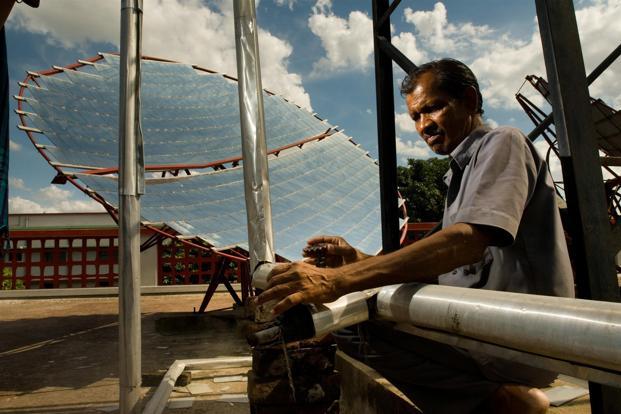New Delhi: The government is shifting up gears for renewable energy promotion with a clutch of policy measures to be rolled out soon. These are meant to protect clean energy producers from payment delays by distribution firms, and the latter from the eroding market for conventional grid-connected power due to wider adoption of roof-top solar power generation, a government official said.
New and renewable energy secretary Upendra Tripathy told reporters on the sidelines of the Renewable Energy India Expo in Greater Noida that the government is in the process of instituting a $400 million (over Rs.2,600 crore) fund sourced from World Bank that will be used to protect clean energy producers from payment delays by distribution firms.
Tripathy said the government was also exploring the possibility of setting up a scheme that will compensate power distribution companies (discoms) that lose a part of their market for conventional power from the grid due to the increased adoption of rooftop solar power projects by institutions and households.
This will address the reluctance of discoms to actively promote rooftop solar power generation projects.
“We have to find a mechanism for compensating distribution firms for loss of market share. We are now studying which entities are losing revenue and the extent of their loss in different cities arising from rooftop power projects,” Tripathi said.
The three-day expo started on Wednesday.

The government has set a target of achieving 40 gigawatts (GW) of rooftop solar power capacity by 2022, as part of an overall solar power target of 100 GW. Distribution companies that have signed long-term power purchase deals with power producers will anyway have to pay a fixed component of the power cost even if they do not buy the committed level of power, which acts as a disincentive for promoting rooftop solar power projects.
According to Munehiko Tsuchiya, executive director of New Energy and Industrial Technology Development Organization of Japan, who was present on the occasion, the Asia-Pacific region is set to witness more investments in renewable energy than the rest of the world. “Within Asia, while China is slowing down, India will emerge as the bastion of growth for renewable energy,” Tsuchiya said.
India’s proposed payment guarantee fund will cushion power produces from payment delays of up to 12 months by making available the amounts due to them from distribution firms for the period.
Tripathy said the fund will be administered either by the Indian Renewable Energy Development Agency or the Solar Energy Corp. of India.
According to Ashok Haldia, managing director and chief executive of PTC India Financial Services, a lender to the energy sector, some power generation companies earlier used to delay interest payments by five to six months to the lender. They have now improved their repayment record by narrowing the delays to two to three months because their customers—distribution companies, or discoms—have improved their payment record.
“This is an indirect way of gauging the improvement in the financial health of distribution companies,” said Haldia. State governments are implementing a debt takeover scheme for discoms to turn them around.
Tripathy said the government will auction solar projects with a combined capacity of about 20,000 megawatts (MW) this fiscal year. It had auctioned 21,000 MW in 2015-16.
In such auctions, companies that offer to sell solar power at the lowest rate get the projects. Auctions have led to a reduction in solar power tariff to below Rs.5 a unit now, from about Rs.15 a unit a few years ago.